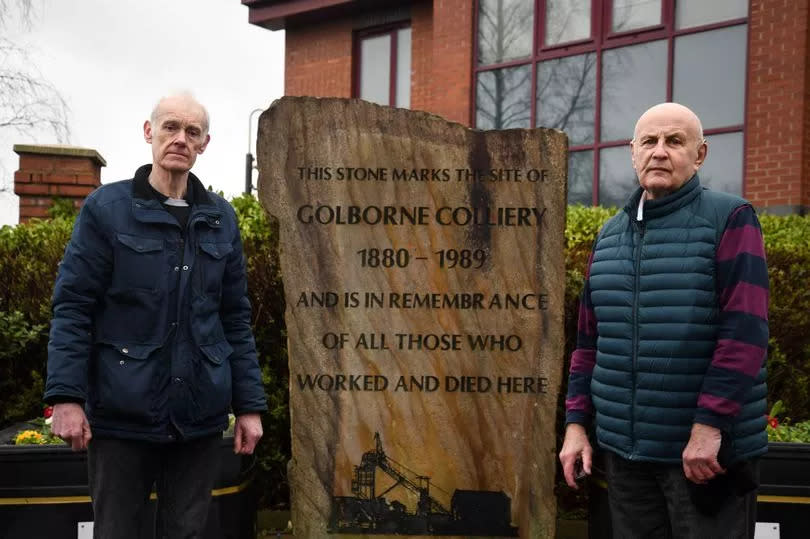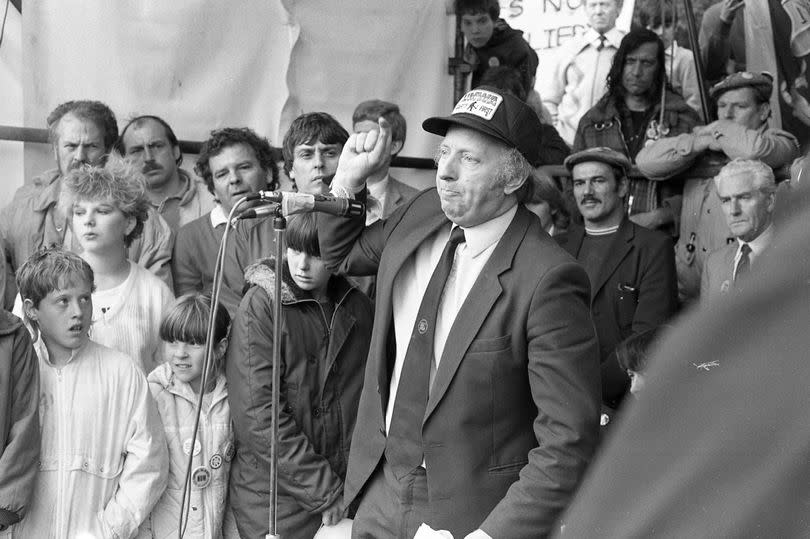'We had a community, now we don't': The Miners Strike changed a Greater Manchester village forever

'Once a miner always a miner' reads the sign hung on the wall in Derek Doherty's living room. The 66-year-old was just a teenager when he followed his dad and grandad down the pit at Golborne Colliery in Wigan.
As an underground fitter he had a good job and a trade he could fall back on. But, 40 years ago this week, he would make a decision which would change his life forever.
On March 5, 1984, miners at Cortonwood Colliery near Barnsley, South Yorks, walked out in protest at the proposed closure of the pit. It was the start of the Miners Strike, the longest and most bitter industrial dispute in British history.
Read more: Coal queen Rita and the lost world of the 'Pit Brow Lasses'
The next day it was announced 20 pits were set for closure. Strikes were called at mines across Yorkshire, then, on March 12, NUM president Arthur Scargill called for national action, beginning nationwide walk-outs.
"It was about two or three days after [the miners walked out at Cortonwood] that the first picket arrived at Golborne," said Derek. "The pit was only a mile away from home so if it was nice I'd walk to work, but it was raining, so I drove.
"The pickets were from Yorkshire. I stopped the car and they asked me for my support. I said 'I'll not cross a picket line,' and that was that. I didn't go back to work for another 12 months."

At Golborne roughly two thirds of the 800 National Union of Mineworkers members walked out. But, across the Lancashire coalfield, an official ballot was held which saw the miners narrowly voting to stay in.
"We'd had two tastes of what the Tories were like in the strikes in 1972 and 1974," said Eric Foster, 77, who back then was a fitter at Golborne and a Labour councillor and NUM official. "But it was different when it came to 1984.
"It wasn't about a pay rise. We were trying to fight for our jobs, our industry and our communities."

Back in 1984 Golborne was a typical mining town. The colliery was the main source of employment, but it was also home to an iron foundry, jam works and yarn factory.
There was a Labour Club, several pubs and four fish and chip shops. And the community was also recovering from its own tragedy: in 1979, 10 miners were killed in an underground explosion known as the Golborne Pit Disaster.
But the strike would cause deep divisions within the close-knit community. It set miner against miner, neighbour against neighbour and left deep scars that in some cases are still felt today.
"It split the community," said Derek. "I had a close friend who worked. I stopped speaking to him.
"There was a family from Bolton working down Golborne. The two sons went on strike, but the dad worked. The sons never spoke to their dad again. It was a hard time."

"There are still people I haven't spoken to since the strike," said Eric. "I can't forgive them even now. It was awful.
"I know people who went in the Labour Club. They wouldn't look at you. They knew they had let us down. They let society down."
At its height around 140,000 miners were out on strike. It cost around 26 million working days, the most since the General Strike of 1926.
For 12 long, hard months, the men and their families fought for their jobs and their communities. But as the strike dragged on Margaret Thatcher's government refused to bend.

Miners in Nottinghamshire and South Leicestershire started a rival union, the Democratic Union of Mineworkers. And as winter kicked in and the hardship began to take its toll, miners across the country began drifting back to work.
"The lads were strong, they were principled," said Eric. "But the pressure was immense, especially on those with families and no money coming in at all.
"When winter came and some of those lads went back to work, we knew then the damage was done, but I don't blame them at all."

On March 3, 1985, Scargill and the NUM voted to end the strike after 362 days. Derek was in the union office at Golborne when the news came on the radio.
The following Tuesday the men marched back to work under the NUM branch banner, defeated but unbowed.
"I was devastated," said Derek. "It was a battle and we'd lost, but we felt a sense of pride. We marched back with our heads held high."
"We fought the fight and we had pride," added Eric. "We had nothing to be ashamed of. We did what we had to do."
Within five years Golborne Colliery was closed, bringing to an end more than 100 years of coal mining in the area. Today the only reminder of an industry which employed thousands of people is an inscribed granite block at the site of the old pit gates which pays tribute to those who lost their lives in the disaster.

The strike changed the community, but it also changed the men who took part.
"I was always a trusting person, but the strike changed my outlook on life, I think," said Derek. "I'd always see the best in everyone, but it made me more wary of people. I'd always had respect for the police, but during the strike it was close to a police state.
"Mining was a dangerous occupation. Everyone watched out for everyone else. It meant there was a camaraderie down the pit.
"But after the strike, when we went back to work, I wouldn't say that camaraderie was gone, but it had been eroded."
The strike also signalled a dramatic change in the world of work. Trade union membership is now around half of what it was in 1979, and strict legislation means large-scale strikes are increasingly difficult to hold.
The heavy industries which provided much of the employment in northern towns and cities have all but been wiped out. In many places they've largely been replaced by poorly-paid, insecure jobs in retail or warehousing, traditionally workplaces without strong union representation.
Dr Stephen Mustchin, a senior lecturer and researcher on industrial relations at the University of Manchester, says that's had a huge impact on workers' rights, pay and conditions.
"As the 80s went on there were six major acts of Parliament which restricted what unions were able to do," he previously told the Manchester Evening News. "Things like workplace votes, a show of hands, were made unlawful. Bit by bit it's become harder for unions to take industrial action.
"The rights of workers to organise were increasingly delegitimised, both by government and employers. Workers increasingly lost the power of collective bargaining over conditions and pay, and pay was increasingly set unilaterally. In lower paid work, jobs on minimum wage, pay is set by the state."

But over the last few years as the cost-of-living crisis continues and wages stagnate, workers in several industries have been taking action. Disputes between train companies and trade unions have been dragging on for more than 18 months.
Last week junior doctors took part in their 10th strike since last March in a dispute over pay. Binmen, BT staff, barristers, bus drivers, teachers, university workers and Post Office staff have also taken industrial action.
"What we've seen since 2010 and austerity, especially across the public sector, is year upon year of below inflation pay-rises," said Dr Mustchin. "We've also seen conditions eroded in a lot of jobs that were traditionally regarded as professional."
Eric Foster, now secretary of Golborne Ex-Miners, believes the consequences of the Miners Strike are still being felt today. "Once we were beaten the Tories knew they could suppress the unions full stop," he said.
"They won. Nowadays people don't think to join a union. It's not the way of the world any more."

Derek Doherty agrees, but given his time again, says he would do exactly the same thing. "I wouldn't change anything," he said.
"We were fighting for our jobs. I've had several jobs since the pit, but there was nowhere near the camaraderie of the pit. We had a community and now we don't."

 Yahoo News
Yahoo News 
